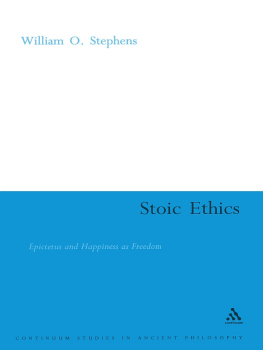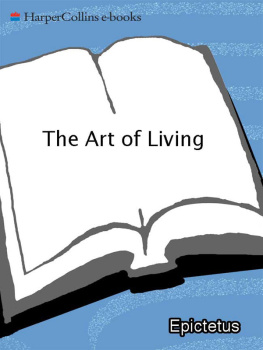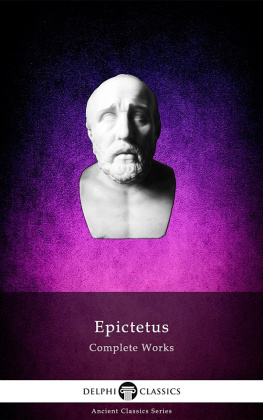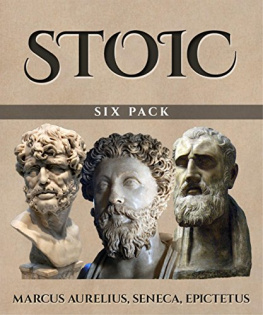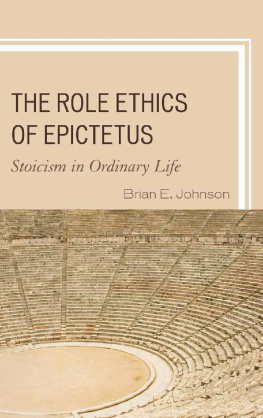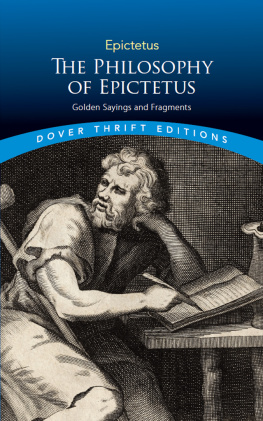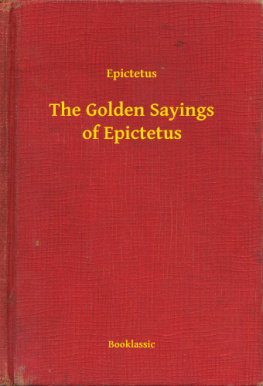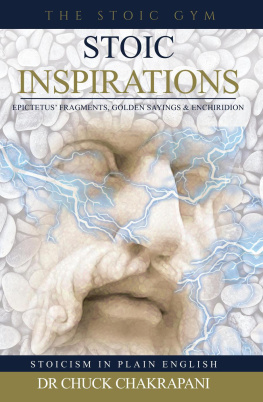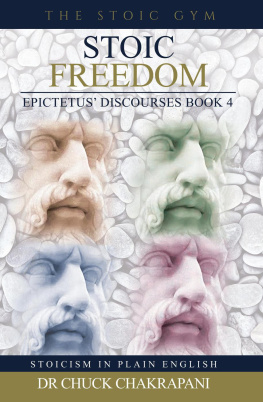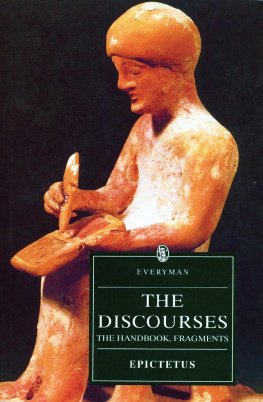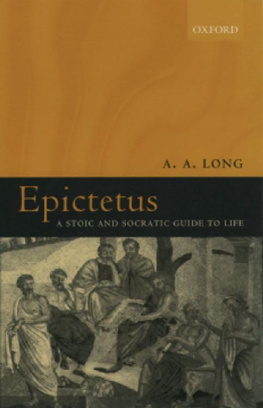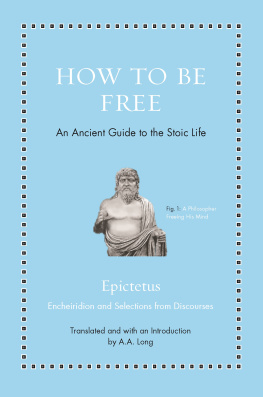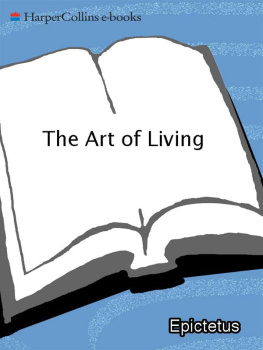Epictetus. - Stoic ethics: epictetus and happiness as freedom
Here you can read online Epictetus. - Stoic ethics: epictetus and happiness as freedom full text of the book (entire story) in english for free. Download pdf and epub, get meaning, cover and reviews about this ebook. City: New York, year: 2017;2011, publisher: Bloomsbury Publishing Plc, genre: Science. Description of the work, (preface) as well as reviews are available. Best literature library LitArk.com created for fans of good reading and offers a wide selection of genres:
Romance novel
Science fiction
Adventure
Detective
Science
History
Home and family
Prose
Art
Politics
Computer
Non-fiction
Religion
Business
Children
Humor
Choose a favorite category and find really read worthwhile books. Enjoy immersion in the world of imagination, feel the emotions of the characters or learn something new for yourself, make an fascinating discovery.
- Book:Stoic ethics: epictetus and happiness as freedom
- Author:
- Publisher:Bloomsbury Publishing Plc
- Genre:
- Year:2017;2011
- City:New York
- Rating:4 / 5
- Favourites:Add to favourites
- Your mark:
- 80
- 1
- 2
- 3
- 4
- 5
Stoic ethics: epictetus and happiness as freedom: summary, description and annotation
We offer to read an annotation, description, summary or preface (depends on what the author of the book "Stoic ethics: epictetus and happiness as freedom" wrote himself). If you haven't found the necessary information about the book — write in the comments, we will try to find it.
Epictetus.: author's other books
Who wrote Stoic ethics: epictetus and happiness as freedom? Find out the surname, the name of the author of the book and a list of all author's works by series.
Stoic ethics: epictetus and happiness as freedom — read online for free the complete book (whole text) full work
Below is the text of the book, divided by pages. System saving the place of the last page read, allows you to conveniently read the book "Stoic ethics: epictetus and happiness as freedom" online for free, without having to search again every time where you left off. Put a bookmark, and you can go to the page where you finished reading at any time.
Font size:
Interval:
Bookmark:
STOIC ETHICS
Also available from Continuum:
Aristotles Ethics, Hope May
Aristotles Theory of Knowledge, Thomas Kiefer
Aristotle, Ethics and Pleasure, Michael Weinman
Ciceros Ethics, Harald Thorsrud
Happiness and Greek Ethical Thought, Andrew Holowchak
Platos Stepping Stones, Michael Cormack
The Ideas of Socrates, Matthew S. Linck
STOIC ETHICS
Epictetus and Happiness as Freedom
William O. Stephens

Continuum International Publishing Group
The Tower Building | 80 Maiden Lane |
11 York Road | Suite 704 |
London SE1 7NX | New York |
NY 10038 |
William O. Stephens 2007
All rights reserved. No part of this publication may be reproduced or transmitted in any form or by any means, electronic or mechanical, including photocopying, recording, or any information storage or retrieval system, without permission in writing from the publishers.
British Library Cataloguing-in-Publication Data
A catalogue record for this book is available from the British Library.
ISBN: HB: 0-8264-9608-3
9780826496089
Library of Congress Cataloging-in-Pubhcation Data
A catalog record for this book is available from the Library of Congress.
Foreword
This is a lightly edited version of my 1990 doctoral dissertation at the University of Pennsylvania supervised by Professor Charles H. Kahn tided Stoic Strength: An Examination of the Ethics of Epictetus. After leaving Penn, I turned to other projects at Creighton without a serious thought to seek a publisher for the largest early relic of my years of fascination with Epictetus. On 15 September 2004 Dr Jim Fieser of the Philosophy Department at the University of Tennessee at Martin emailed me with that very thought. Without his prompting, encouragement, and persistence, this monograph would have been fated to remain undisturbed, collecting dust in the archives of University Microfilms International in Ann Arbor, as it were, perched precariously above the dustbin of history. Readers will judge whether publishing this dissertation is a case of the old clich Better late than never.
Technologically speaking, 1990 was an age ago. The manuscript was produced using a Magnavox Videowriter and an IBM correcting Selectric typewriter with a Greek font element. Email was unknown. Yet Epictetus gritty charm endures. So the bibliography has been updated to include selected publications after 1990 in which Epictetus figures prominently, but not work in Stoic ethics broadly. My hope is that others may find this monograph as useful as Jim believes it is. I dedicate this dusted-off package, retitled to please my publisher, to him. I also again thank my colleagues at Penn for their generous comments and support offered long ago.
August 2006
WOS
Abbreviations
D.L. | Hicks, R. D. (1925, 1972 repr.) (tr.), Dwgenes Laertius:Lives of Eminent Philosophers. 2 vols. Loeb Classical Library. London: W. Heinemann. |
NE | Aristotle, Nicomachean Ethics, in W. D. Ross and J. A. Smith (1908-52) (trs), The Works of Aristotle. Oxford: Clarendon Press. |
ENCH | Encheridion = Handook. The Discourses are cited by book, chapter, and section, and the Encheridion by chapter and section |
SEAM | Mutschmann, H. and Mau, J. (1961) (eds), Sexti EmpiriciOpera, vols II and III Adversus Mathematicos. Leipzig: Teubner. |
SVF | Arnim, H. von, Stoicorum Veterum Fragmenta. Vols 1-3 (1903-05), Vol. 4 (1924), indexes by M. Adler. Leipzig: Teubner. |
thos anthrpi daimn.
A persons character is his fate.
Herakleitos
Es ist die Sache der Wenigsten, unabhngig zu sein:es ist ein
Vorrecht der Starken.
It is the concern of extremely few to be independent: it is a
privilege of the strong.
E W. Nietzsche
Preface
A quick sketch of the last twelve decades of scholarship on Epictetus can provide a bit of orientation. The German giant of Epictetus studies was BonhfFer (1890, 1894, 1911). He remains the only author of not two but three volumes on our philosopher. The contributions of subsequent German scholars have been much more modest in scope. So these are good times for studying Epictetus. I hope that this study provides a sufficiently fresh approach to understanding the character of his style of teaching Stoic wisdom.
Epictetus was born the son of a slave woman in Hierapolis in Phrygia For both men this art of living consisted in determining what the philosopher must know in order to judge and act correctly.
It was during the time he was owned by Neros freedman and administrative secretary Epaphroditus that Epictetus took lessons from the great Stoic teacher of the day, C. Musonius Rufus. Oldfather claims that
[s]o many passages in Epictetus can be paralleled closely from the remaining fragments of Rufus (as Epictetus always calls him) that there can be no doubt but the system of thought in the pupil is little more than an echo, with changes of emphasis due to the personal equation, of that of the master.
Sandbach observes that Rufus makes some use of the denial that anything indifferent is good or bad: the proofs of this should, he says, constantly be repeated; it is a truth which demonstrates that exile cannot rob a man of anything really good. Moreover, the emphasis on the necessity of an austere and frugal lifestyle is certainly shared by both the master and his pupil.
Epictetus was among the philosophers expelled from Rome by the emperor Domitian (presumably in 89 or 92 CE ) . He moved to Nicopolis in Epirus and founded a school in order to promulgate the ideas of Stoicism. The four books entitled Arrians Discourses of Epictetus are generally believed to be not the transcripts of the formal readings of Stoic disquisitions, but rather Epictetus expositions of particular issues from those readings and practically oriented responses to his students recitations given to them in less formal seminars. As to the question of the accuracy of Arrians reporting of Epictetus lectures, I concur with De Lacy that
[w]e need only assume that Epictetus had a systematic ethics which he taught in his school and which Arrian used for a framework in the first book of the Discourses. In spite of his literary imitation of Xenophon, Arrian has portrayed in detail the methods and subjects of Epictetus teaching. It is not unlikely, therefore, that the plan of Arrian s work is based on Epictetus system of ethics.
Senecas writings are interesting in themselves yet sometimes lack the earnest spirit of Stoicism so evident in Epictetus Discourses. Senecas life and personal practices fell far short of the austere Stoic ethics he preached, Marcus is primarily concerned with consoling himself, whereas Epictetus interest is not a private one. The former slave turned teacher makes a concerted effort to instill the doctrine of Stoicism in his students by urgently reminding them that they must persistently and rationally apply what they learn in the classroom to every situation of their daily lives.
In short, if we observe, we shall find mankind distressed by nothing so much as by the irrational, and again attracted to nothing so much as to the rational. Now it so happens that the rational and the irrational are different for different persons, precisely as good and evil, and the profitable and the unprofitable, are different for different persons. It is for this especially that we need education, so as to learn how, in conformity with nature, to adapt to specific instances our preconceived idea of what is rational and what is irrational. But for determining the rational and the irrational, we employ not only our estimates of the value of external things, but also the criterion of that which is in keeping with ones character. (1.2.47)
Next pageFont size:
Interval:
Bookmark:
Similar books «Stoic ethics: epictetus and happiness as freedom»
Look at similar books to Stoic ethics: epictetus and happiness as freedom. We have selected literature similar in name and meaning in the hope of providing readers with more options to find new, interesting, not yet read works.
Discussion, reviews of the book Stoic ethics: epictetus and happiness as freedom and just readers' own opinions. Leave your comments, write what you think about the work, its meaning or the main characters. Specify what exactly you liked and what you didn't like, and why you think so.

